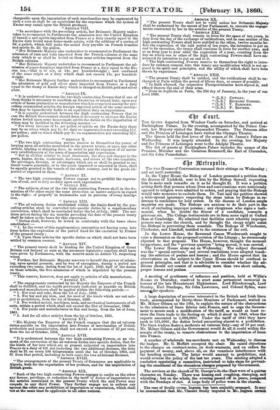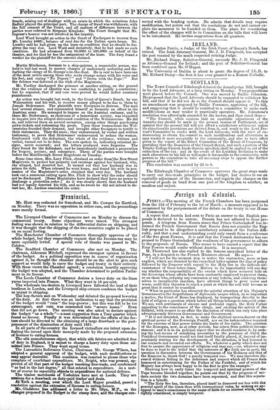t4t Vttrugntio.
The two Houses of Convocation resumed their sittings on Wednesday ; and sat until yesterday. In the Upper House the Bishop of London presented a petition from the diocese of Lichfield, sent to him by the Bishop thereof, requesting him to make such remarks on it as he thought fit. It was a petition, setting forth that persons whose lives and conversations were notoriously opposed to religion were admitted to orders, and praying that the Bishops would take measures to exclude them. Dr. Tait said the petition showed; a wide-spread ignorance respecting the steps taken by Bishops in re- ference to candidates for holy orders. In the diocese of London awl* inquiries are made. The Bishops are anxious to do their part in the work of excluding improper persons ; any clergyman who signs a testi- monial, when he doubts the fitness of a candidate, commits a grievous sin. The College testimonials are in form more rigid at Oxford than at Cambridge. He admitted that facilities exist whereby improper persons may enter the church, and he thought the clergy might assist
i the Bishops in preventing these scandals. The Bishops of Winchester, Chichester, and Llandaff, testified to the existence of the evil.
In the Lower House, the Reverend Canon Wordsworth sought to raise a discussion on the proposed revision of the Liturgy ; he strenuously objected to that proposal. The House, however, thought the moment inopportune, and the " previous question " being moved, it was carried: -
The Lower House alone sat on Wednesday. The subject discussed was the special services," and several resolutions were adopted touch- ing the selection of psalms and lessons ; and the House agreed that its observations on the subject to the Upper House should be confined to general principles, and that is is advisable to consider whether the ad- ditions should not consist of something more than two short collects,• proper lessons and psalms.
A meeting of gentlemen of influence and position, held at Willis'a Rooms on Thursday, resolved to erect some permanent memorial in honour of the late Mountstuart Elphinstone. Lord Ellenborougb, Lord Stanley, Earl Stanhope, Sir John Lawrence, and Colonel Sykes, were amonethe speakers.
A large deputation of persons interested in the British and Irish linen trade, accompanied by thirty-three Members of Parliament, waited on Mr. Milner Gibson on the 10th, to explain the nature of the obstructions. to the admission of linen fabrics into France, and to urge the Govern-. ment to secure such a modification of the tariff, as would at least re- store the linen trade to the footing on which it stood in 1840, when the exports amounted to 1,000,0001. Under the tariff of 1841 they have sunk to 151,0001., the duties levied amounting almost to a prohibition. The linen traders desire a moderate ad valorem duty—say of 10 per cent. Mr. Milner Gibson said the Government would do all it could within the margin of the treaty, to remove obstructions to the importation of linen into France.
A number of wholesale tea-merchants met on. Wednesday, to discuss the budget. Mr. G. Moffatt occupied the chair. He raised objections to the charges on contract-notes, on dock-warrants, and on orders for payment of money, and, above all, on the vexatious interference with the bonding system. The latter would amount to prohibition, and would reverse the policy of the last ten years. The meeting adopted a resolution appointing a committee, instructed to take steps for prevent- ing the enactment of the obnoxious charges proposed by Government.
The services at the church of St. George's-in-the-East were of a quieter character on Sunday. There was hissing and coughing, stamping, and whistling ; but on the whole, the evening passed off in peace, compared with the Sundays of riot. A large body of police were in the church.
The case of Scully versus Ingrain has been amicably arranged. It may be remembered that Mr. Vincent Scully imputed to Mr. Ingram certain frauds, arising out of dealings with an estate in which the notorious John Sadleir played the principal part. The charge of fraud was withdrawn, with the full consent of the Court, and all matters of difference between the parties were referred to Sergeant Kinglake. The Court thought that Mr. Ingram's honour was not involved in the inquiry.
Lord Ward brought an action in the Court of Exchequer to recover from Mr. Lumley 4560/., balance of rent due for the Italian opera house. Mr. Lumley said he had given up the lease on condition that he should be for- given the rent due. Lord Ward said decisively, that he had made no such condition. He had advanced from 90,0001. to 100,0001. on behalf of the theatre, and for that he has the assignment of the lease. The Jury found a verdict for the plaintiff for the amount claimed.
Martin Mitcheson, foreman to a ehip-painter, a respectable person, was held to bail last week to answer charges of maliciously molesting and dis- turbing the clergy of St. George's-in-the-East. He is said to have been one of the most active among those who made strange noises with his voice and his feet, and crying " No Popery !" and " Down with the Pope !" But the defence was deferred at the wish of the Magistrate.
Mr. Yardley discharged the prisoner at another sitting, on the ground that the evidence of identity was too conflicting to justify a conviction ; but he repeated, that if any case were proved he would inflict summery punishment.
An action was brought last week, in the Court of Queen's Bench, by one Welzenstein and his wife, to recover money alleged to be due to them by Joseph Stohwasser. The plaintiffs were foreigners in distress. The man had several aliases, and represented himself as formerly an officer in the Austrian army. He managed to impose on the Austrian embassy, and by them Mr. Stohwasser, as chairman of a benevolent society, was requested to inquire into the alleged distressed condition of the Welzensteins. He did so, and relieved them on several occasions, among other things purchasing pawn-tickets and redeeming the goods. Upon these transactions the Wel- zensteins founded their demand, and brought other foreigners to testify to their statements. They did more ; they endeavoured, by verbal and written testimony, to prove that Stohwasser endeavoured to seduce the woman. Confronted with the defendant, the whole of the evidence, written and verbal, turned out to be false. The acts spoken to, indicating criminal de- signs, never occurred ; and the letters produced were forgeries. The Jury found for the defendant, and he immediately instituted a prosecution for forgery, perjury, and conspiracy. Three of the parties were brought before the Marlborough Street Magistrate on Tuesday.
Some time since, Mrs. Lucy Flick, obtained an order fromIthe Bow Street Magistrate to protect her property and earnings against her husband, who, she alleged, had deserted her. It turned out that her husband was in prison for debt. When released he went home, and found his wife in pos- session of the Magistrate's order, obtained that very day. The husband took out a summons calling upon Mrs. Flick to show why the order should not be discharged. [Some Magistrates have declared they have no power to discharge a protection order.] As it was clearly shown that the husband had not legally deserted his wife, and as he swore he did not intend to de- sert her, Mr. Jardine rescinded the order.



























 Previous page
Previous page